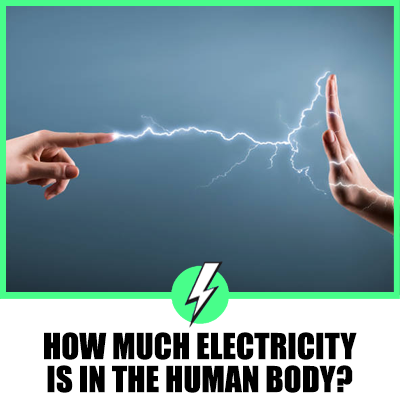How Much Electricity Is In The Human Body?
The human body, a marvel of nature, is a complex system that performs numerous functions simultaneously.
One of the most intriguing aspects of the human body is its ability to generate electricity.
Yes, you read that right.
The human body, in its own unique way, produces electricity.
But how much electricity does the human body emit?
Let’s delve into this electrifying topic.

Contents
The Human Body: A Natural Powerhouse
Every human body is a natural powerhouse.
Our cells are specialized to conduct electrical currents.
This electricity is required for the nervous system to send signals throughout the body and to the brain, making it possible for us to move, think, and feel.
The elements in our bodies, like sodium, potassium, calcium, and magnesium, have a specific electrical charge.
Almost all of our cells can use these charged elements, called ions, to generate electricity.
How Much Electricity Does the Human Body Emit?
The human body, in its resting state, produces around 100 watts of power.
This is enough to power a light bulb.
However, during a bicycle race, an elite cyclist can produce close to 400 watts of mechanical power over an hour and in short bursts over double that—1000 to 1100 watts.
An adult of good fitness is more likely to average between 50 and 150 watts for an hour of vigorous exercise.
Over an 8-hour work shift, an average, healthy, well-fed, and motivated manual laborer may sustain an output of around 75 watts of power.
Do All Humans Have Electricity in Their Body?
Yes, all humans have electricity in their bodies.
This electricity is generated by the chemical reactions that occur in our cells.
The human body uses this electricity for several functions, including transmitting signals in the nervous system and triggering muscle contractions.
Without this electricity, our hearts wouldn’t beat, our muscles wouldn’t contract, and our brains wouldn’t receive any signals.
What Type of Electricity is in the Human Body?
The electricity in the human body is essentially a form of bioelectricity.
Bioelectricity refers to the generation and transmission of electric currents in biological systems.
It is a vital part of many physiological processes, including sensory mechanisms like vision, hearing, and touch, as well as muscle contraction and the functioning of the nervous system.
Insights from Online Discussions
Online discussions reveal a fascination with the concept of human electricity.
Many people are surprised to learn that the human body can generate electricity.
Some discussions focus on the potential applications of this electricity, such as powering small devices.
Others delve into the science behind this phenomenon, exploring how our cells generate and use electricity.
The Role of Electricity in Bodily Functions
The human body uses electricity in several ways.
For instance, our nervous system uses electricity to send signals that control various bodily functions.
These electrical signals, also known as nerve impulses, travel from our brain to different parts of our body, enabling us to move, feel, and think.
Our heart, one of the most vital organs in our body, also relies on electricity.
A specialized group of cells in our heart, known as the sinoatrial node, generates an electrical signal that travels through our heart, causing it to contract and pump blood throughout our body.
The Impact of External Electrical Forces on the Body
While our bodies generate their own electricity, they can also be affected by external electrical forces.
For instance, exposure to strong electromagnetic fields can interfere with the electrical functioning of our bodies, potentially leading to health issues.
On the other hand, controlled exposure to certain types of electrical stimulation can have therapeutic effects, such as in the case of transcutaneous electrical nerve stimulation (TENS) for pain relief.
The Future of Bioelectricity in Medicine and Technology
The understanding of how our bodies generate and use electricity has opened up exciting possibilities in the fields of medicine and technology.
For instance, researchers are exploring ways to harness our body’s bioelectricity for powering implantable medical devices.
This could eliminate the need for surgeries to replace the batteries of these devices.
In conclusion, the human body is indeed a natural powerhouse, capable of generating its own electricity.
This electricity plays a crucial role in many of our body’s most essential functions.
So, the next time you flip a light switch or power up a device, remember the incredible power that’s coursing through your own body.





